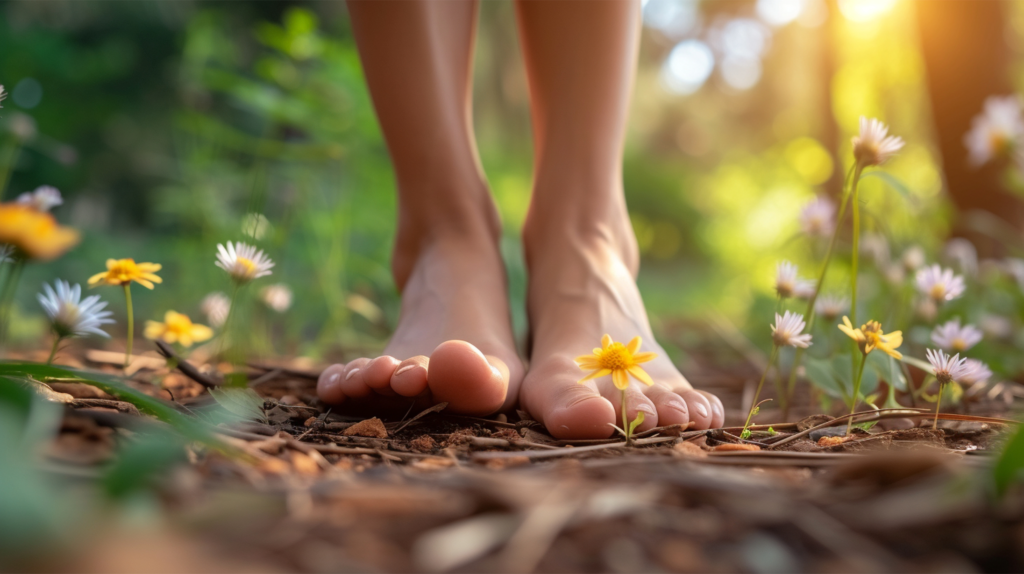The Importance of Grounding: Connecting with Nature for Better Health

In today’s fast-paced world, many people spend their days indoors, surrounded by artificial light, electronics, and constant distractions. While technology has its benefits, this disconnect from nature can take a toll on our physical and mental well-being. Grounding, also known as earthing, is the practice of connecting with the Earth’s energy to restore balance and enhance overall health. By engaging in grounding activities, such as walking barefoot on grass, meditating in nature, or receiving bodywork treatments that promote energy flow, we can improve circulation, reduce stress, and support our body’s natural healing abilities.
What Is Grounding?
Grounding is based on the idea that the Earth carries a natural, subtle electrical charge. When we come into direct contact with the ground—whether through bare skin or natural materials like stone and water—our bodies absorb this energy, helping to balance internal systems. This practice is backed by emerging scientific research, which suggests that grounding can reduce inflammation, improve sleep, and support overall well-being.
For centuries, holistic traditions have emphasized the connection between humans and nature. Many forms of bodywork, including Deep Muscle Therapy (DMT), Manual Lymphatic Drainage (MLD), Cranial-Sacral Therapy, and Hot Stone Therapy, align with grounding principles by helping clients reconnect with their bodies and release built-up tension.
The Health Benefits of Grounding
1. Reduces Stress and Anxiety
Grounding has been shown to regulate the nervous system, helping to calm the mind and body. Walking barefoot, sitting under a tree, or even lying on the grass can activate the parasympathetic nervous system, which promotes relaxation. Therapies like Cranial-Sacral Therapy also help regulate the nervous system by gently releasing tension in the body, leading to a deep sense of calm and balance.
2. Enhances Circulation and Detoxification
Poor circulation can lead to discomfort, fatigue, and toxin buildup in the body. Grounding encourages better blood flow, while therapies like MLD (Manual Lymphatic Drainage) further support the body’s natural detoxification process by reducing fluid retention and promoting the movement of lymph. Combining grounding practices with lymphatic massage can help the body release excess waste and improve overall energy levels.
3. Reduces Inflammation and Pain
Chronic inflammation is linked to various health issues, including arthritis, heart disease, and autoimmune disorders. Research suggests that grounding can lower inflammation markers in the body, making it a natural way to support pain relief. Similarly, Deep Muscle Therapy (DMT) and Hot Stone Therapy are effective in reducing pain by promoting circulation, loosening tight muscles, and supporting the body’s ability to heal itself.
4. Improves Sleep and Energy Levels
Exposure to artificial lighting, screen time, and stress can disrupt sleep cycles. Grounding helps regulate circadian rhythms, leading to better sleep quality and increased energy throughout the day. If you struggle with restlessness, incorporating Hot Stone Therapy into your routine can help relax muscles and prepare the body for a restful night’s sleep. The warmth of the stones mimics the grounding effects of nature, allowing for deep relaxation.
5. Supports Emotional Well-being
Spending time in nature is a proven mood booster. Fresh air, sunlight, and the presence of natural elements help balance hormones, reducing symptoms of anxiety and depression. Holistic therapies like Cranial-Sacral Therapy align well with grounding practices, as they help release emotional tension stored in the body. This type of therapy works with the body’s rhythms, promoting both physical and emotional healing.
How to Incorporate Grounding Into Your Routine
Grounding is simple and accessible. You can incorporate it into your daily life through small, mindful practices, such as:
- Walking barefoot on natural surfaces like grass, sand, or soil
- Sitting or lying on the ground for a few minutes each day
- Meditating outdoors to connect with the elements
- Spending time near bodies of water, such as lakes or rivers
- Receiving holistic treatments like Hot Stone Therapy, Deep Muscle Therapy, MLD, or Cranial-Sacral Therapy to enhance the body’s natural grounding processes
Grounding is a powerful practice that reconnects us with nature, reduces stress, and promotes overall well-being. Whether through direct contact with the Earth or by receiving holistic treatments that encourage deep relaxation and balance, taking time to ground yourself can lead to profound physical and emotional benefits. By incorporating grounding into your wellness routine, you can restore harmony within your body, mind, and spirit—one step, one breath, and one moment at a time.




